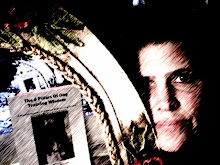 There's a lot in the news about today being the 200th birthday of 16th U.S. President Abraham Lincoln and that is all good and well and Happy Birthday to you to, Abe. But what a lot of people don't know is that on that same day in 1809, across the pond from Lincoln's birthplace of Hodgenville, Kentucky, over in Shrewsbury, Shropshire, England, Charles Darwin was also born. The stars must really have been aligned that day for two such amazing men to have been born, their passions and life work still resonating two centuries later.
There's a lot in the news about today being the 200th birthday of 16th U.S. President Abraham Lincoln and that is all good and well and Happy Birthday to you to, Abe. But what a lot of people don't know is that on that same day in 1809, across the pond from Lincoln's birthplace of Hodgenville, Kentucky, over in Shrewsbury, Shropshire, England, Charles Darwin was also born. The stars must really have been aligned that day for two such amazing men to have been born, their passions and life work still resonating two centuries later.Darwin's path led him to become the most highly respected naturalist of the 19th century. He was a devoted family man (he and his wife Emma had 10 children, although not all of them lived to adulthood, common in those times), and, contrary to other Victorian era country gentlemen, spent inordinate amounts of time shaping his children's thirst for knowledge.
Outside of his rich and intensely involved family life, Darwin spent a lifetime exploring the natural world and became a different kind of father, that of evolutionary biology.
Charles Darwin also, not surprisingly, loved dogs.
"The first sparks of interest in natural history were developed very early in his childhood. Darwin relates how his mother, Susannah, taught him how to change the color of flowers by giving them water mixed with food coloring....Darwin also had an extreme fondness of dogs - easily winning their affection, and took great pleasure in fishing along the River Severn that flowed along the back of his parents' house."
Dogs have one of the widest variations in size of any species and it's due to the influence of our species, Homo Sapiens. To work with dogs, understand dogs better, relate to your own dog or dogs on greater and greater levels of depth, there is value to understanding the science, even just a little bit. As science probes deeper into DNA, and we now can test our own dogs to learn just what breeds are in there, the nature part of the nature/nurture equation. That gene pool may be effecting how our dog behaves, and we may not like it, but it's hardwired. You can train against the grain, but you have to know what the grain is!
 For me, trying to take down a notch the "go to the moon" escalating of my JRT, Trip, in certain situations has caused me to regroup, refocus, and retrain. It's going well. I am aware of his triggers and it's always important to address at the very beginning. It's identifying what "the beginning" is that matters. It's usually several dozen behaviors BEFORE we usually say a trigger occurs. If the trigger incites an over the top, what I call The Highway to Hell reaction, I stop, wait, and proceed when there is evidence of calm. Now calm in a Jack Russell Terrier who is excited and calm in, say, an excited but overall mellow English Springer Spaniel, are two different animals, and that's exactly why I give homage to the terrier-ness of Trip and work at his own ability, not that of a mellower breed type. I carry it into every trigger situation, and I have to say, he's definitely improving, and it's enough to compel me to commit to the consistency, time, patience that is required. After all, I let some of it continue for his whole life, so I am taking back responsibility as I explore The Six Pillars for myself.
For me, trying to take down a notch the "go to the moon" escalating of my JRT, Trip, in certain situations has caused me to regroup, refocus, and retrain. It's going well. I am aware of his triggers and it's always important to address at the very beginning. It's identifying what "the beginning" is that matters. It's usually several dozen behaviors BEFORE we usually say a trigger occurs. If the trigger incites an over the top, what I call The Highway to Hell reaction, I stop, wait, and proceed when there is evidence of calm. Now calm in a Jack Russell Terrier who is excited and calm in, say, an excited but overall mellow English Springer Spaniel, are two different animals, and that's exactly why I give homage to the terrier-ness of Trip and work at his own ability, not that of a mellower breed type. I carry it into every trigger situation, and I have to say, he's definitely improving, and it's enough to compel me to commit to the consistency, time, patience that is required. After all, I let some of it continue for his whole life, so I am taking back responsibility as I explore The Six Pillars for myself.Hopefully, as you continue on your quest to shape your own beast(s) into the dog of your dreams, you'll weave your scientific knowledge into your hands on relationship with your dog, whatever his or her function for you in your life at this time.
Oh, and join me in wishing Mr. Darwin a happy 200th!

No comments:
Post a Comment